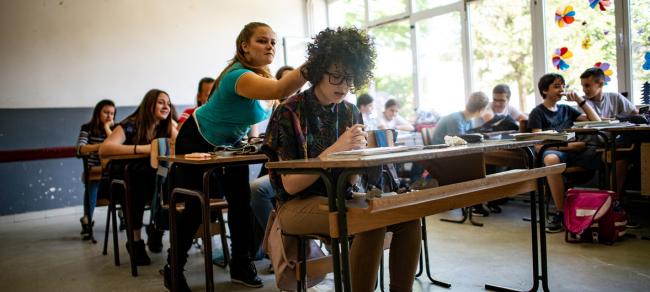
Bullying: Protection for children is a ‘fundamental human right’ says top UN advocate
New York, Oct 9 (IBNS): Around 130 million, or one-in-three children worldwide, experience some form of bullying, the United Nations stated on Monday, in its latest report on how children can be better-protected. This form of violence has long-lasting and direct consequences for their health, school performance and overall well-being.
“Being protected from bullying is a fundamental human right,” said Marta Santos Pais, Special Representative of the Secretary-General on Violence against Children.
At an event at UN headquarters in New York, co-organized with the Governments of Mexico and Lithuania, Santos Pais presented the key findings of the Secretary-General report and welcomed the “growing interest” from the world on the matter, applauding efforts made so far in terms of policy, law and advocacy to protect the safety of children.
Earlier this year, for example, Member States agreed on the adoption of a new indicator in the monitoring of the implementation of the Sustainable Development Goals (SDGs). Indicator 4.a.2 now measures the percentage of students who have experienced bullying in the past year, by gender, and for each contributing country.
Despite such encouraging signs, the Special Representative identified several key areas where improvement was needed for Governments and institutions.
First, she emphasized the importance of early childhood prevention and noted that the “parent-child relationship is a critical factor in predicting the risk of bullying in adolescence”. According to the report, today, 176 million children under-five, witness domestic violence on a regular basis and children who bully others are twice as likely to have been exposed to domestic violence than other children.
“Exposure to toxic stress, domestic violence and a violent family environment has an irreversible impact on the development of very young children,” she said, adding that “it contributes to normalize the use of violence”.
Today, approximately 30 per cent of adolescents in 39 countries in Europe and North America, admit to bullying others at school.
In addition, Santos Pais noted that teachers also play a great role in promoting “a culture of respect and safety” in schools and that sports environments can often become contexts where competitiveness leads to “humiliation, shaming and exclusion of those who fail to win”.
“Analyses of data from Ethiopia, India, Peru and Viet Nam reveal that violence in schools, including physical and verbal abuse by teachers and by other students, is the most common reason given for disliking school, and, significantly, it is associated with lower scores in mathematics and lower self-esteem,” the report highlights.
To address these negative impacts, experts and decision-makers are lacking sufficient data to form evidence-based strategies and programmes. However, the UN Educational, Scientific and Cultural Organization (UNESCO) has committed to tackling this gap and to producing an annual report to be released in January 2019 for the first time.
Some of the initial findings published already denote that physical appearance – such as being overweight or having non-conforming gender expressions – is the main driver for bullying. Race, nationality and skin color are also high on the list. In the report, religion was not highlighted as major contributing factor.
While the term “bullying” covers physical, psychological and sexual violence (understood in this context to mean sex-related mockery and gender-based discrimination), very little data is available on the psychological occurrence of it, and countries must do more to gain a better understanding of this issue. The UNESCO report shows that girls and boys are equally affected overall by bullying, but that boys are more likely to suffer from physical violence.
Cyberbullying on the rise
Cyberbullying, which can cause profound harm as it leaves a permanent footprint online and can quickly reach wide audiences, is on the rise, UNESCO’s report notes. In seven European countries overall, the proportion of children online aged 11-16 who’ve suffered cyberbullying, increased from 7 per cent in 2010, to 12 per cent in 2014.
Countries and institutions can adopt a wide variety of measures to help reverse these trends, including carrying out awareness-raising campaigns and teacher-trainin, adopting laws that clearly define bullying and pushing schools to implement concrete actions such as helplines for children.
The report of the Secretary-General will be presented on Tuesday to the Third Committee of the General Assembly so next steps can be determined.
“Children are eager to see action to bring this manifestation of violence to an end,” said Ms. Santos Pais. “And they deserve no less!”
Support Our Journalism
We cannot do without you.. your contribution supports unbiased journalism
IBNS is not driven by any ism- not wokeism, not racism, not skewed secularism, not hyper right-wing or left liberal ideals, nor by any hardline religious beliefs or hyper nationalism. We want to serve you good old objective news, as they are. We do not judge or preach. We let people decide for themselves. We only try to present factual and well-sourced news.







